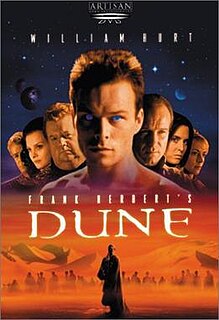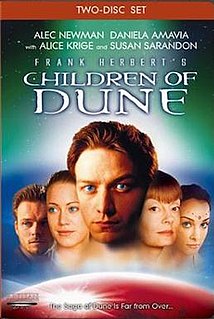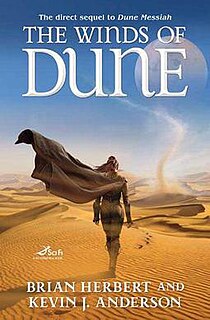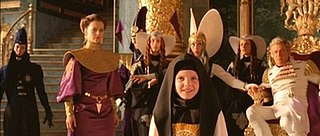
Chapterhouse: Dune is a 1985 science fiction novel by Frank Herbert, the last in his Dune series of six novels. It rose to No. 2 on The New York Times Best Seller list.

Franklin Patrick Herbert Jr. was an American science-fiction author best known for the 1965 novel Dune and its five sequels. Though he became famous for his novels, he also wrote short stories and worked as a newspaper journalist, photographer, book reviewer, ecological consultant, and lecturer.

Kevin James Anderson is an American science fiction author. He has written spin-off novels for Star Wars, StarCraft, Titan A.E. and The X-Files, and with Brian Herbert is the co-author of the Dune prequel series. His original works include the Saga of Seven Suns series and the Nebula Award-nominated Assemblers of Infinity. He has also written several comic books, including the Dark Horse Star Wars series Tales of the Jedi written in collaboration with Tom Veitch, Dark Horse Predator titles, and The X-Files titles for Topps. Some of Anderson's superhero novels include Enemies & Allies, about the first meeting of Batman and Superman, and The Last Days of Krypton, telling the story of how Superman's planet Krypton came to be destroyed.

Dune is a 1965 science-fiction novel by American author Frank Herbert, originally published as two separate serials in Analog magazine. It tied with Roger Zelazny's This Immortal for the Hugo Award in 1966, and it won the inaugural Nebula Award for Best Novel. It is the first installment of the Dune saga; further, in 2003, it was cited as the world's best-selling science fiction novel.

A sandworm is a fictional creature that appears in the Dune novels written by Frank Herbert, first introduced in original novel Dune (1965).

Brian Patrick Herbert is an American author who lives in Washington state. He is the elder son of science fiction author Frank Herbert.

Frank Herbert's Dune is a three-part science fiction television miniseries based on the 1965 titular novel by Frank Herbert. It was written and directed by John Harrison. The ensemble cast includes Alec Newman as Paul Atreides, William Hurt as Duke Leto, and Saskia Reeves as Lady Jessica, as well as James Watson, P. H. Moriarty, Ian McNeice, and Giancarlo Giannini.

Dune: House Corrino is a 2001 science fiction novel by Brian Herbert and Kevin J. Anderson, set in the fictional Dune universe created by Frank Herbert. It is the third book in the Prelude to Dune prequel trilogy, which takes place before the events of Frank Herbert's celebrated 1965 novel Dune. The Prelude to Dune novels draw from notes left behind by Frank Herbert after his death.

Dune is a science fiction media franchise that originated with the 1965 novel Dune by Frank Herbert and has continued to add new publications. Dune is frequently cited as the best selling science fiction novel in history. It won the inaugural Nebula Award for Best Novel in 1965 and the 1966 Hugo Award, and was later adapted into a 1984 film and a 2000 television miniseries. Herbert wrote five sequels, and the first two were presented as a miniseries in 2003. The Dune universe has also inspired some traditional games and a series of video games. Since 2009, the names of planets from the Dune novels have been adopted for the real-world nomenclature of plains and other features on Saturn's moon Titan.

The Dune Encyclopedia is a 1984 collection of essays written by Willis E. McNelly and multiple other contributors as a companion to Frank Herbert's Dune series of science fiction novels. Though approved by Herbert, his own introduction rendered the Encyclopedia non-canon. This was reasserted by the Herbert estate after the 1999 publication of the prequel novel Dune: House Atreides by Brian Herbert and Kevin J. Anderson.

Dune: House Atreides is a 1999 science fiction novel by Brian Herbert and Kevin J. Anderson, set in the fictional Dune universe created by Frank Herbert. It is the first book in the Prelude to Dune prequel trilogy, which takes place before the events of Frank Herbert's celebrated 1965 novel Dune. Bantam Books made a $3 million deal for the novels in 1997. The Prelude to Dune novels draw from notes left behind by Frank Herbert after his death.

Frank Herbert's Children of Dune is a three-part science fiction miniseries written by John Harrison and directed by Greg Yaitanes, based on Frank Herbert's novels Dune Messiah (1969) and Children of Dune (1976). First broadcast in the United States on March 16, 2003, Children of Dune is the sequel to the 2000 miniseries Frank Herbert's Dune, and was produced by the Sci Fi Channel. Children of Dune and its predecessor are two of the three highest-rated programs ever to be broadcast on the Sci-Fi Channel. In 2003, Children of Dune won a Primetime Emmy Award for Outstanding Special Visual Effects, and was nominated for three additional Emmys.
Julie Cox is an English actress. She played Princess Irulan in the Sci Fi Channel's 2000 miniseries Frank Herbert's Dune and its 2003 sequel, Frank Herbert's Children of Dune. She also played The Childlike Empress in The Neverending Story III.

The Road to Dune is a collection of science fiction works and related material by American writers Frank Herbert, Brian Herbert and Kevin J. Anderson. A companion book to the Dune novels, the book was released in September 2005.

A series of Duneshort stories have been written that relate to the Dune novels by Frank Herbert, Brian Herbert and Kevin J. Anderson. Some of these stories were originally available for download from the official Dune website, released in a promotional capacity in conjunction with the Brian Herbert/Kevin J. Anderson novels. "Dune: A Whisper of Caladan Seas", "Dune: Hunting Harkonnens", "Dune: Whipping Mek", and "Dune: The Faces of a Martyr" were later published as part of the collection The Road to Dune released in September 2005. "Dune: Sea Child" was published in Elemental, a 2006 benefit anthology for children who survived the 2004 Indian Ocean tsunami, and was later made available as part of the paperback edition of The Road to Dune. "Dune: Treasure in the Sand" was published online in 2006 at Jim Baen's Universe, and was later made available as part of the paperback edition of Hunters of Dune. "Dune: Wedding Silk" was released June 12, 2011 in the Dune e-book short story collection Tales of Dune, which also included previously published stories "Dune: Sea Child" and "Dune: Treasure in the Sand." "Dune: Red Plague" was released on November 1, 2016, followed by "Dune: The Waters of Kanly" in the short story collection Infinite Stars on October 17, 2017.

Frank Herbert's Dune is a 2001 3D video game based on the 2000 Sci Fi Channel miniseries of the same name. The game was not a commercial or critical success, and was one of the last games by Cryo Interactive, which went bankrupt shortly after the game's failure.

The Winds of Dune is a science fiction novel written by Brian Herbert and Kevin J. Anderson, set in the Dune universe created by Frank Herbert. Released on August 4, 2009, it is the second book in the Heroes of Dune series and chronicles events between Frank Herbert's Dune Messiah (1969) and Children of Dune (1976). Before publication, the novel's title was initially announced as Jessica of Dune.
This is a list of works by the science fiction author Frank Herbert.

Multiple organizations of the Dune universe dominate the political, religious, and social arena of the fictional setting of Frank Herbert's Dune series of science fiction novels, and derivative works. Set tens of thousands of years in the future, the saga chronicles a civilization which has banned computers but has also developed advanced technology and mental and physical abilities through physical training, eugenics and the use of the drug melange. Specialized groups of individuals have aligned themselves in organizations focusing on specific abilities, technology and goals. Herbert's concepts of human evolution and technology have been analyzed and deconstructed in at least one book, The Science of Dune (2008). His originating 1965 novel Dune is popularly considered one of the greatest science fiction novels of all time, and is frequently cited as the best-selling science fiction novel in history. Dune and its five sequels by Herbert explore the complex and multilayered interactions of politics, religion, ecology and technology, among other themes.
We've a three-point civilization: the Imperial Household balanced against the Federated Great Houses of the Landsraad, and between them, the Guild with its damnable monopoly on interstellar transport.

The Dune prequel series is a sequence of novel trilogies written by Brian Herbert and Kevin J. Anderson. Set in the Dune universe created by Frank Herbert, the novels take place in various time periods before and in between Herbert's original six novels, which began with 1965's Dune. In 1997, Bantam Books made a $3 million deal with the authors for three Dune prequel novels, partially based upon notes left behind by Frank Herbert, that would come to be known as the Prelude to Dune trilogy. Starting with 1999's Dune: House Atreides, the duo have published 11 Dune prequel novels to date. In 2011 Publishers Weekly called the series "a sprawling edifice that Frank Herbert’s son and Anderson have built on the foundation of the original Dune novels." Jon Michaud of The New Yorker wrote in 2013, "The conversion of Dune into a franchise, while pleasing readers and earning royalties for the Herbert estate, has gone a long way toward obscuring the power of the original novel."
















